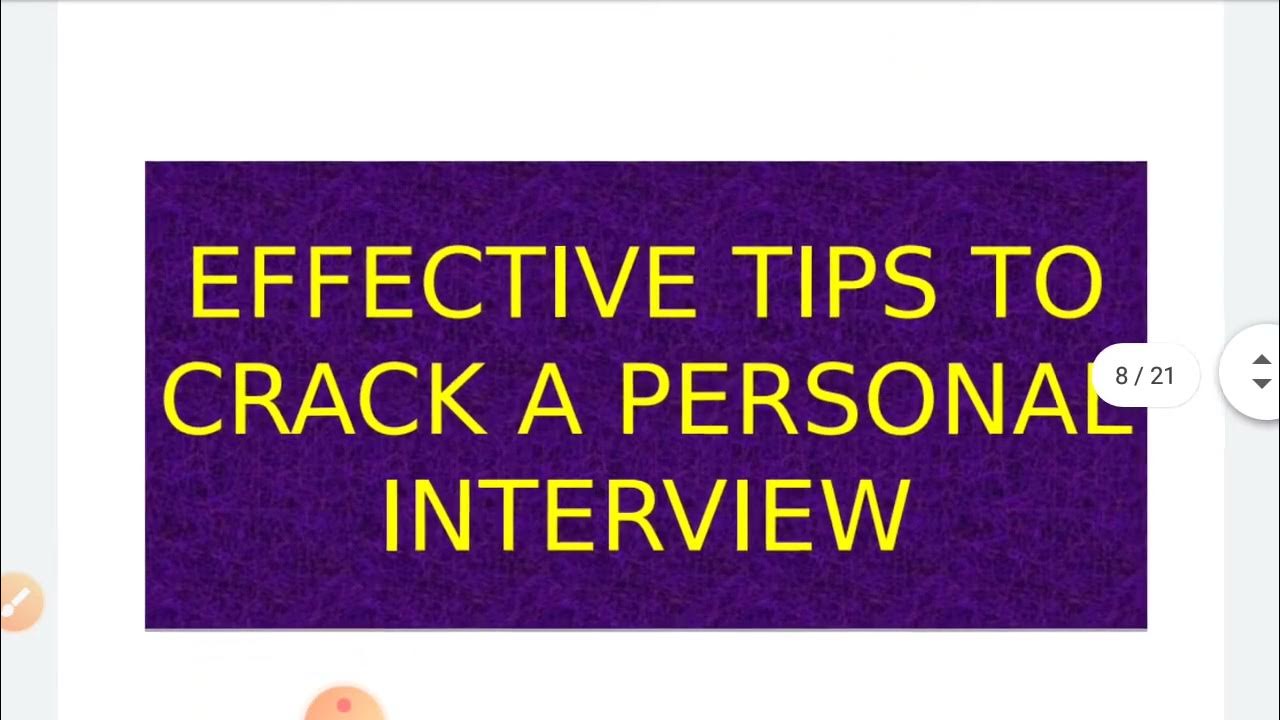Top Interview Tips: Common Questions, Nonverbal Communication & More | Indeed
Summary
TLDRThis video dissects and analyzes the entire interview process, offering tips on body language, etiquette, and answering common questions. It follows Anya, a recent business grad, as she interviews for a project management position. Key advice includes maintaining confident posture, staying calm, and treating everyone respectfully. The video emphasizes being authentic, honest, and prepared with thoughtful questions for the employer. Finally, it highlights the importance of following up with a thank-you email to leave a lasting impression.
Takeaways
- 📍 The interview process begins as soon as you enter the building, emphasizing the importance of first impressions.
- 👁️ Maintaining eye contact and treating everyone with respect is crucial, as anyone can provide feedback on you.
- 💨 Dealing with nerves is normal; deep breathing exercises can help you stay calm before the interview starts.
- 👋 Greeting people authentically and using their names can help create a positive connection.
- 🗣️ Being prepared for small talk and having current events or topics in mind shows you are engaged and informed.
- 🤔 Practicing answers to common interview questions can help you respond confidently and thoughtfully.
- 🌟 Honesty in your responses allows you to stand out and align your past experiences with your future goals.
- 🙅♀️ Avoid speaking negatively about previous workplaces; focus on the lessons learned instead.
- 🤝 Showcasing your personality and interpersonal skills can make a positive impact during the interview.
- 🕴️ Being aware of your body language and mimicking the interviewer's posture subtly can create a sense of connection.
- 🚫 Avoid unnecessary movements like finger tapping or leg bouncing to stay present and focused during the interview.
- ❓ Having a list of questions for the employer shows your interest and preparation for the role.
- 💌 Following up with a thank-you email within 24 hours leaves a lasting impression and shows appreciation.
Q & A
What is the significance of the interview in the job search process?
-The interview is arguably the most crucial part of the job search process, as it can make or break an opportunity.
What is the purpose of 'Job Science' mentioned in the script?
-Job Science is a concept that applies the use of science and data analysis to improve job seekers' performance in interviews, similar to how athletes use these methods to enhance their performance.
How should Anya, the recent grad, carry herself during the interview process?
-Anya should maintain good posture with her head up and shoulders pulled back, avoiding slouching or laid-backness, and treat everyone in the office with respect while keeping eye contact.
When does the interview actually start according to the script?
-The interview begins the minute the candidate walks into the building, emphasizing the importance of first impressions and interactions with everyone in the office.
How can a candidate manage their nerves during an interview?
-A candidate can manage nerves by taking a deep breath before entering, holding it, counting to three, and then slowly exhaling to stay calm.
What is the importance of greeting people authentically during an interview?
-Authentic greetings help create a positive first impression and are more likely to help the candidate remember the person's name, which is beneficial for building rapport.
Why is it important to be prepared for small talk before the interview questions begin?
-Small talk can set the tone for the interview and having a few current events or topics in mind can help a candidate engage naturally and confidently with the interviewer.
What does the interviewer look for when asking about a candidate's experience and what they would bring to the role?
-The interviewer is looking to learn what makes the candidate stand out, their honesty, and how their past experiences align with their future goals in the role.
How should a candidate respond when asked about their previous work experiences in an interview?
-A candidate should avoid speaking negatively about previous workplaces and instead focus on the lessons learned and how those experiences have prepared them for the new role.
What is the significance of having questions prepared for the interviewer?
-Having prepared questions shows that the candidate has done their homework, is genuinely interested in the role, and is thinking proactively about what they would need to know if they were to be hired.
Why is it important to follow up with a thank you email after the interview?
-A follow-up thank you email within 24 hours is crucial for leaving a lasting impression, showing appreciation for the interviewer's time, and reinforcing key points discussed during the interview.
Outlines

هذا القسم متوفر فقط للمشتركين. يرجى الترقية للوصول إلى هذه الميزة.
قم بالترقية الآنMindmap

هذا القسم متوفر فقط للمشتركين. يرجى الترقية للوصول إلى هذه الميزة.
قم بالترقية الآنKeywords

هذا القسم متوفر فقط للمشتركين. يرجى الترقية للوصول إلى هذه الميزة.
قم بالترقية الآنHighlights

هذا القسم متوفر فقط للمشتركين. يرجى الترقية للوصول إلى هذه الميزة.
قم بالترقية الآنTranscripts

هذا القسم متوفر فقط للمشتركين. يرجى الترقية للوصول إلى هذه الميزة.
قم بالترقية الآنتصفح المزيد من مقاطع الفيديو ذات الصلة

MALTA Embassy Interview Q/A //Step by Step // How To attend Malta Embassy Interview// Study Visa //

Materi Job Interview |Wawancara Kerja dalam Bahasa Inggris

RMS Interview SECRETS You Wish You Knew!

Personal Interview II Tips and Strategies

“TELL ME ABOUT YOURSELF!” (How to ANSWER “Tell Me About Yourself” in a JOB INTERVIEW!) BEST ANSWERS!

Pass the BP Video Interview | BP Hirevue Interview
5.0 / 5 (0 votes)
